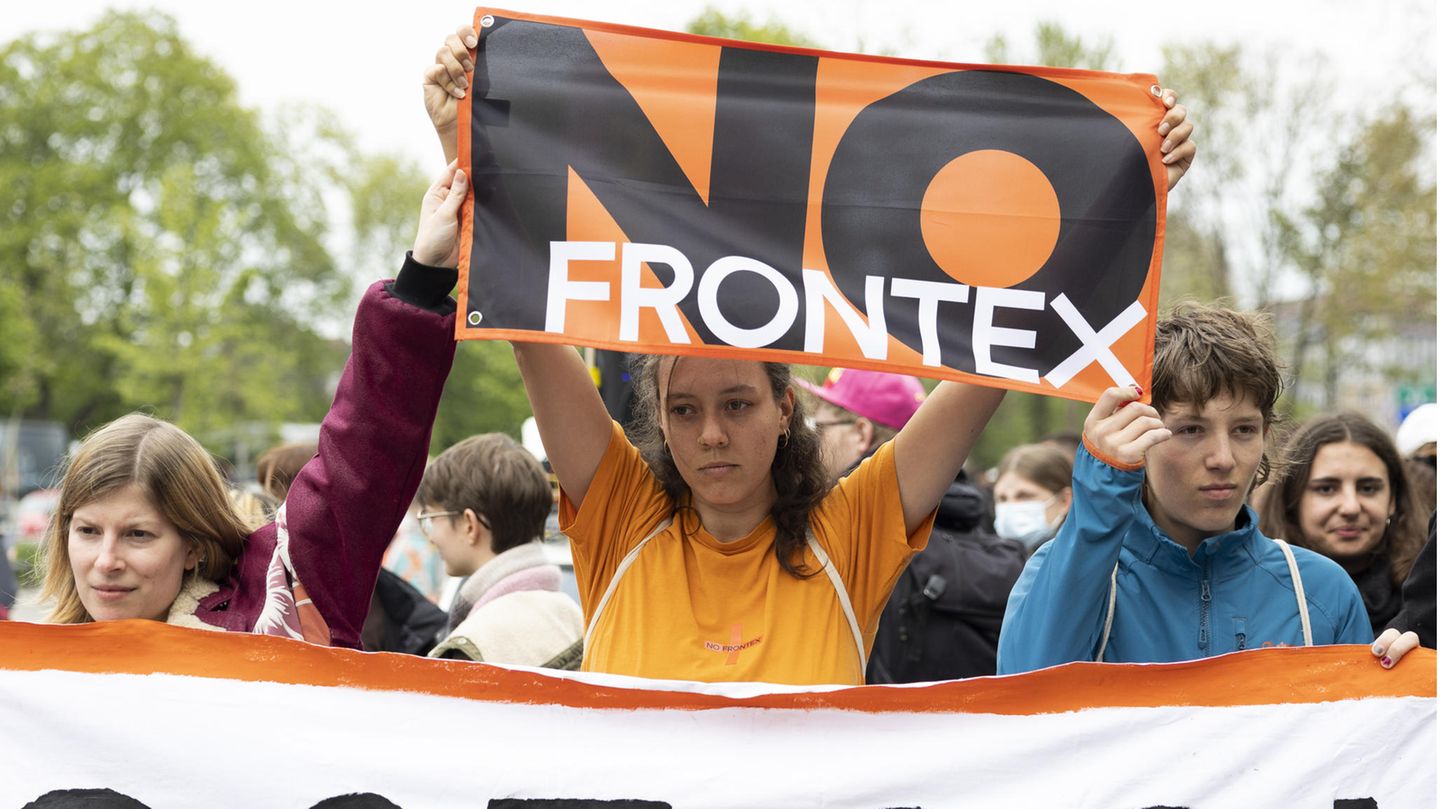Switzerland has no EU external borders, Switzerland is not even a member of the EU. Nevertheless, the country is voting on Sunday about its participation in the EU border guard Frontex. There is a lot at stake.
Seen from the outside, this coordination may come as a surprise at first. Switzerland will vote on Frontex on May 15th. Because although the country is not a member of the EU and has no access to the sea but many mountains, it participates in Frontex. The background is Switzerland’s membership in the Schengen security network. In addition to EU members, this also includes Iceland, Norway, Liechtenstein and Switzerland.
The international agreement serves to reduce border controls. This will make travel and traffic between member countries much easier. Where there is an inside, there is also an outside. This is where Frontex comes in, the controversial European Border and Coast Guard Agency. It provides operational support to the Schengen states in controlling the Schengen external borders, and Switzerland has also been working with Frontex for more than ten years.
The EU is currently expanding the border agency financially and in terms of staff. By 2027, Frontex is to build up a permanent reserve of up to a maximum of 10,000 emergency personnel. Depending on the situation, it should then be possible to fall back on this reserve. The EU regulation came into force in 2019, and the Swiss Parliament approved it the following year. Switzerland should therefore increase staff at Frontex with around 40 full-time positions.
In addition to Parliament, the Swiss government, the Bundesrat, also wants the country to participate in the Frontex expansion. “Frontex is important for controlling the Schengen external borders and for security in the Schengen area. This is also in Switzerland’s interest. By participating in Frontex, it assumes responsibility and helps to shape it,” was the reasoning.
“Violence, misery and death at Europe’s external borders”
Opponents of the template paint a completely different picture. For them, Frontex is partly responsible for “violence, misery and death at Europe’s external borders”. Nevertheless, there are plans to massively expand Frontex – also with money from Switzerland. Anyone who is serious about protecting refugees must stop the expansion of Frontex.
A referendum was successfully held against the decision from the Federal Republic of Bern. That means it will be voted on. On May 15, the citizens who are entitled to vote will decide whether to say “yes” or “no” to Swiss participation in the Frontex expansion. The supporters of the no slogan include groups that campaign for refugees, young left-wing parties and feminist collectives. They criticize that the current EU migration policy is based on militarization, “a network of camps and brutal border violence.” Frontex plays an important role in this policy. “No contract justifies supporting this regime,” opponents are convinced.
Frontex has been under criticism for a long time – not only in Switzerland. At the end of April, the board of directors of the authority announced that the previous executive director, Fabrice Leggeri, had resigned with immediate effect. The Frenchman has led the agency, which was founded in 2004, since 2015 and saw his agency exposed to serious allegations.
This is particularly about possible illegal refusals of people seeking protection at the EU’s external borders. According to media reports, Greek border guards have illegally driven boats with migrants back towards Turkey several times. Rejections of people seeking protection at the external borders – so-called pushbacks – are illegal under international law. Frontex officials are said to have been nearby and not prevented this. Several EU bodies recently dealt with the allegations. And that’s not all of the criticism.
The European Parliament has doubts about Frontex’s budget management. For this reason, the budgetary relief for 2020 was initially postponed. In a resolution passed with a large majority, the MPs point out that Frontex has still not fulfilled the conditions from the previous discharge report.
There is a lot at stake for Switzerland in the Frontex vote
In an interview with the “NZZ”, Marco Benz, Switzerland’s representative on the Frontex board of directors, says that the question of fundamental rights has become increasingly important in the Frontex bodies. What Benz also emphasizes: Switzerland can make a significant contribution and, for example, have a say in the pre-selection of the new fundamental rights officer. The “NZZ” also states that Switzerland was part of a working group of the agency that worked up the pushback allegations and developed suggestions for improving the processes. And two experts from Switzerland are currently helping to set up the new, larger fundamental rights office at the Frontex headquarters in Warsaw.
There is a lot at stake for Switzerland with this vote. The government points to the possible consequences of a refusal: “Switzerland risks being excluded from Schengen/Dublin if it says no.” Dublin means the convention that regulates which state in Europe is responsible for examining asylum applications: the country in which the initial registration takes place. It’s a long way to Switzerland. This is also known in Bern.
“The asylum system would be directly affected,” said Justice Minister Karin Keller-Sutter in the run-up to the vote. Today, the content of asylum applications in Switzerland is generally not checked if an application has already been made in another Dublin state. If Switzerland falls out of Dublin, it would be the “first country of asylum”. Persons who were rejected in a Dublin country, for example in neighboring Italy, could then apply for asylum in Switzerland.
Karin Keller-Sutter also referred to the consequences of a Schengen exclusion and emphasized the importance of the Schengen Information System (SIS), an “indispensable system” for the Swiss authorities, according to the Minister of Justice. Swiss authorities would make 300,000 inquiries per day, with 20,000 hits per year. Fighting cross-border crime, terrorism and illegal migration is now “unthinkable” without SIS. It has become the “backbone of the Swiss police force”.
Opponents speak of a “threatening backdrop”
Opponents see the Federal Councilor’s words as a “threatening backdrop”. It is true that the Schengen treaty does have a strict exit clause that applies if Switzerland does not adopt further developments of the so-called Schengen acquis. Rather, the “No Frontex” camp argues that there are political negotiation opportunities to clarify the continuation of the cooperation.
If Switzerland actually voted “No”, Switzerland’s cooperation with the Schengen and Dublin countries would end automatically, unless the EU Commission and all EU countries plus Switzerland find a solution within 90 days.
It doesn’t look as if such a way out would be necessary: In an SRG survey from the beginning of May, a clear 69 percent of the participants said yes to financing Frontex.
Sources: , , , , , , with material from the dpa
Source: Stern
David William is a talented author who has made a name for himself in the world of writing. He is a professional author who writes on a wide range of topics, from general interest to opinion news. David is currently working as a writer at 24 hours worlds where he brings his unique perspective and in-depth research to his articles, making them both informative and engaging.




